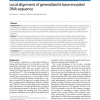Free Online Productivity Tools
i2Speak
i2Symbol
i2OCR
iTex2Img
iWeb2Print
iWeb2Shot
i2Type
iPdf2Split
iPdf2Merge
i2Bopomofo
i2Arabic
i2Style
i2Image
i2PDF
iLatex2Rtf
Sci2ools
114
click to vote
BMCBI
2010
2010
Local alignment of generalized k-base encoded DNA sequence
Background: DNA sequence comparison is a well-studied problem, in which two DNA sequences are compared using a weighted edit distance. Recent DNA sequencing technologies however observe an encoded form of the sequence, rather than each DNA base individually. The encoded DNA sequence may contain technical errors, and therefore encoded sequencing errors must be incorporated when comparing an encoded DNA sequence to a reference DNA sequence. Results: Although two-base encoding is currently used in practice, many other encoding schemes are possible, whereby two ore more bases are encoded at a time. A generalized k-base encoding scheme is presented, whereby feasible higher order encodings are better able to differentiate errors in the encoded sequence from true DNA sequence variants. A generalized version of the previous two-base encoding DNA sequence comparison algorithm is used to compare a k-base encoded sequence to a DNA reference sequence. Finally, simulations are performed to evaluat...
Related Content
| Added | 08 Dec 2010 |
| Updated | 08 Dec 2010 |
| Type | Journal |
| Year | 2010 |
| Where | BMCBI |
| Authors | Nils Homer, Stanley F. Nelson, Barry Merriman |
Comments (0)

